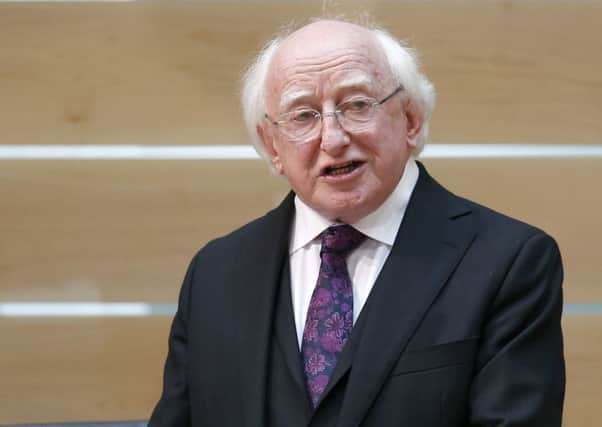Irish leader draws famine parallel with today's refugee crisis


He claimed some of the rhetoric used today about those crossing the Mediterranean “marine grave” was similar to the British media’s during the worst period of Ireland’s 19th century catastrophe.
The leader unveiled in Dublin a Celtic cross memorial to Ireland’s one million Famine dead following the failure of the potato crop.
Advertisement
Hide AdAdvertisement
Hide AdHe said: “As we pray for the souls of all of those lost to famine, and in particular those lost in our own Great Famine, we must pray, too, that we not be condemned to repeat the mistakes of the past as we deal with the challenges of feeding the hungry in our own times.”
Ireland’s Great Hunger between 1845 and 1849 saw skeletal peasants selling their only clothing in an attempt to survive.
Over a million Irish died of hunger and related diseases, and two million fled a country “with no hope”.
Many who emigrated faced fresh marginalisation on arrival on foreign shores.
Advertisement
Hide AdAdvertisement
Hide AdPresident Higgins asked: “Is there not a lesson for all of us, as we are faced in our own time with the largest number of displaced people since World War II, as the Mediterranean becomes, for many, a marine grave, as European nations fail to respond to their humanitarian obligations?
“Isn’t some of the rhetoric invoked today similar to what in the worst periods were the opinions of the London Times?
“We now have the capacity to anticipate the threat of famine. We have the capacity to take measures to avoid it; and yet we allow nearly a billion people across our world to live in conditions of extreme but avoidable hunger.
“The moral principle - the moral challenge of our humanity- remains the same: should we adjust our populations to an abstracted economic ideology, or should we, rather, use the best of our reason to craft economic and social models that can anticipate the needs and care for the peoples who share this fragile planet?”
Advertisement
Hide AdAdvertisement
Hide AdIt was concluded by British administrators in the 1840s that the giving of relief directly to those dying would constitute a “moral hazard”.
President Higgins noted it was important, in the minds of those who sought to respond to the Famine, to continue the project of moral reform even amidst the greatest loss of life.
“Avoiding the creation of dependency, as imperial elites saw it, was a target that could not be allowed to slip.”
The president inaugurated a Celtic Cross memorial to the victims in their single largest burial ground at Glasnevin Cemetery in Dublin. At the height of the Famine more than 60 funerals a day were taking place there.
Advertisement
Hide AdAdvertisement
Hide AdPresident Higgins added: “Surrounded by the remains of victims from all corners of the country, we should embrace the common bond that connects us to those who have gone before throughout the history of this island.”